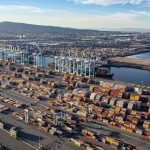The UK can take steps to maintain its position as a leading maritime nation, according to Maritime London chair Harry Theochari.
Speaking to Seatrade Maritime News Europe Editor Gary Howard for The Maritime Podcast, Maritime London chair and Senior Consultant at Norton Rose Fulbright, Harry Theochari shared some of his priorities for the UK maritime and shipping industries.
Thechari said that the UK needs a dedicated shipping minister to give government a better understanding of the significance and details of the maritime and shipping industries and how they operate.
“We’ve had a number of ministers over the past decade and a half or so that I have been fortunate enough to work with. I fear sometimes that the position is used as a stepping stone by some, and to say that these ministers have been transient is a bit of an understatement. They never seem to last a terribly long time. It also doesn’t help that they have other portfolios that involve industries that are very different to ours with different issues, different problems. And they’re operated in a totally different manner with different commercial mechanics,” said Theochari.
Praising current minister Robert Courts, Thoechari said that the minister is pulled in many different directions and that his remit covers sectors like aviation which are closer to voters and have more effective lobbyists than shipping.
Deeper government understanding of the UK maritime industry would help to tackle the issues it faces, including a drop in vessels under the UK flag and drop in UK seafarer numbers.
“You cannot be a great maritime nation without a big and quality British flag with many vessels on there that will employ British seafarers. It’s those British seafarers remember who will then in their second careers come into the city and add so much more value,” said Thoechari, urging any qualified seafarers to look at second careers which make the most of their experience at sea.
“Much as I would like to say that I I really understand shipping, I may understand how to finance a ship, I may understand how to register a ship and deal with certain of the issues that arise in the industry, but I have no real understanding of the practical side of shipping, what the issues are when you’re actually onboard a vessel.”
Shipbuilding and finance
Theochari’s recent experience of financing trends and coming challenges led him to believe that state support is inevitable.
“I have come to the conclusion that intervention by governments is inevitable if we’re going to achieve decarbonisation targets and meet the challenges that we face from new and disruptive technologies. The way they can do this without pumping billions of taxpayers’ money into the industry is to use the export credit agencies,” he said.
“The beauty of export credit agencies is they guarantee up to 80% of loans that have been made available to ship owners. Now, this gives the banks and financial institutions the comfort of knowing that they got a guarantee from a sovereign state, more or less, that covers 80% of what they’re making available… It helps the ship owner tremendously because by getting a government guaranteed for their lenders, they can get much better terms and low rates of interest.”
For governments, the guarantees help drive growth in the engineering and technology sectors, a strategy undertaken by export credit agencies in China, Italy, Germany, Poland and elsewhere.
While UK Export Finance has limited recent experience in the shipping industry, Theochari is confident it has the means to quickly develop the necessary expertise to spur a renaissance in UK shipbuilding.
Theochari said he hasn’t seen much activity in the shipping industry around green financing and green bonds in the UK.
“Banks and financial institutions have tried very hard to ensure that when they lend it is to owners who are trying to decarbonize and do the right thing. We’ve seen the The Poseidon principles come into being, but even they notwithstanding how laudable these efforts are, if you look at the most recent numbers, there’s been very little if any success in decarbonizing their portfolios, so there’s still a lot of work to be done.
“I’m afraid I don’t think that it will be private commerce that’s going to be the answer to this. I cannot see us raising the trillions that will be needed, other than through some kind of government support, some kind of government assistance, and we just need to look at this together, and work out how to take it forward.”
Source: Seatrade Maritime News






